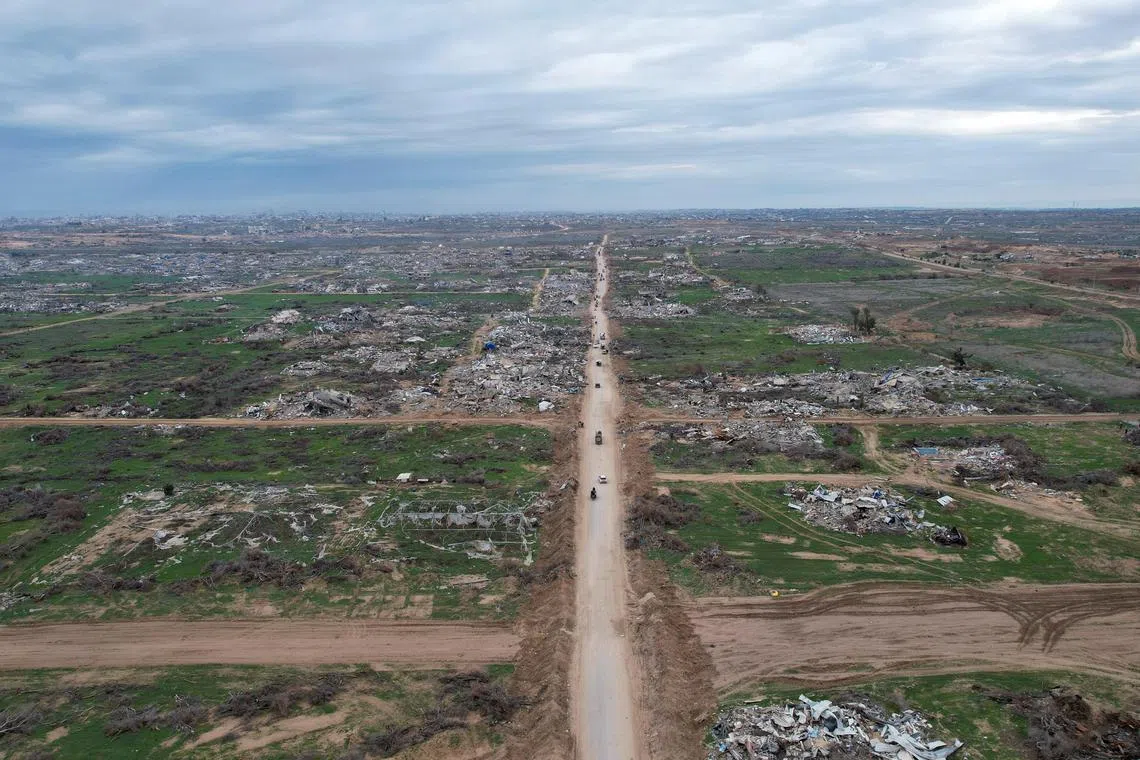Israel’s withdrawal from key Gaza road complete: Hamas
Sign up now: Get ST's newsletters delivered to your inbox

The full withdrawal of troops from the corridor took place a day after Hamas and Israel conducted their fifth hostage-prisoner swop.
PHOTO: REUTERS
GAZA CITY, Palestinian Territories - A Hamas official said Israeli troops on Feb 9 completed their withdrawal from a strategic road bisecting the Gaza Strip, part of a fragile truce deal that Israel said it was implementing.
“Israeli forces have dismantled their positions and military posts and completely withdrawn their tanks from the Netzarim Corridor on Salaheddin Road, allowing vehicles to pass freely in both directions,” an official from the Hamas-run interior ministry said.
AFP journalists saw no troops in the area on Feb 9 as cars, buses, pickup trucks and donkey carts travelled along the road from both the north and south, crossing the Netzarim Corridor where an Israeli checkpoint used to stand.
According to a senior Hamas official, the Israeli withdrawal from Netzarim had been scheduled for Feb 9 under the terms of a truce that took effect on Jan 19,
AFP is unable to independently verify the details of the ceasefire agreement, as its text has not been made public.
Asked about the Feb 9 withdrawal, an Israeli security official who requested anonymity told AFP: “We are preparing to implement the ceasefire agreement according to the guidelines of the political echelon.”
The war began with Hamas’ Oct 7, 2023 attack on Israel
Hotsage-prisoner swop
The 2023 attack, the deadliest in Israeli history, resulted in the deaths of 1,210 people, mostly civilians, according to an AFP tally of official Israeli figures.
Hamas took 251 people hostage into Gaza, of whom 73 remain in the territory, including 34 the Israeli military says are dead.
The health ministry in the Hamas-run Gaza Strip said on Feb 8 that at least 48,181 people had been killed in the Palestinian territory in the war.
Under the terms of the ceasefire, Israel and Hamas are conducting multiple rounds of hostage-prisoner swops.
The fifth such exchange took place on Feb 8, and saw the release of three Israeli hostages and 183 Palestinian prisoners.
Israeli Prime Minister Benjamin Netanyahu denounced Hamas as “monsters” after the handover of the three captives, who appeared emaciated and were forced to speak on a stage ahead of their release.
The hospital treating the hostages said Mr Or Levy and Mr Eli Sharabi were in a “poor medical condition”, while Mr Ohad Ben Ami was in a “severe nutritional state”.
“Dad, is it really you? I can’t believe you’re here,” said one of Mr Ben Ami’s daughters, her eyes wide with disbelief, as the freed Israeli-German hostage embraced her at Tel Aviv’s Ichilov Hospital.
“Yes, I’m here,” Mr Ben Ami replied, hugging his loved ones who had been waiting anxiously for his return.
Of the prisoners freed from Israeli jails, the Palestinian Prisoners’ Club advocacy group said seven required hospitalisation and decried “brutality” and mistreatment in jail.
“We always dreamt that this would happen, that one day the prison director would be forced to open the gates,” said freed prisoner Shadi Barghouti, still in a grey prison tracksuit.
Halfway around the world, in Bangkok, five Thai farm workers held hostage by Hamas and freed in an earlier swop wept with joy and hugged their loved ones as they returned home on Feb 9.
“I thank everyone who helped us make it out. We wouldn’t be here today if it weren’t for them. We can finally return to our motherland,” Mr Pongsak Tan said.
‘Do the job’
The latest exchange came as negotiations were set to begin the next phase of the ceasefire, which is intended to pave the way for a permanent end to the war.
On Feb 8, Mr Netanyahu ordered negotiators to return to Qatar, which helped mediate the truce, while repeating his vow to crush Hamas.
“With the completion of the release phase, Prime Minister Netanyahu has instructed the dispatch of a negotiation delegation to Doha to discuss technical details of the agreement,” his office said in a statement.
It added that on his return to Israel from the United States, where he became the first foreign leader to meet Mr Trump in the White House since the inauguration, Mr Netanyahu will “hold a security Cabinet meeting regarding negotiations for the second phase of the hostage release deal”.
Senior Hamas official Bassem Naim on Feb 8 said Israel’s “lack of commitment in implementing the first phase... exposes this agreement to danger and thus it may stop or collapse”.
Earlier this week, Mr Trump sparked global outrage
He said Egypt or Jordan could take in Palestinians from Gaza – an idea both countries have flatly rejected.
The Israeli defence minister this week ordered the army to prepare for “voluntary” departures from Gaza.
Mr Trump has ruled out sending American troops to the territory, and in an interview with Fox News on Feb 8, Mr Netanyahu hailed the plan and said Israel was willing to “do the job”.
Mr Trump “never said he wants American troops to do the job. Guess what? We’ll do the job,” Mr Netanyahu said.
Egyptian Foreign Minister Badr Abdelatty was heading to Washington on Feb 9, while Jordan’s King Abdullah II was due to meet Mr Trump at the White House on Feb 11.
Egypt will host a summit of Arab nations on Feb 27 to discuss “the latest serious developments” concerning the Palestinian territories, its foreign ministry said on Feb 9. AFP


